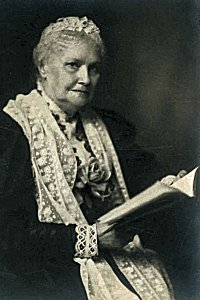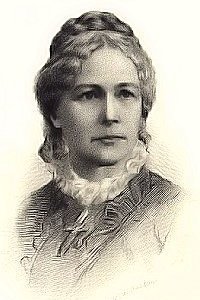Introduction


Born: February 13, 1825, Charleston, South Carolina.
Died: January 18, 1913, Rutland, Vermont, at her home, The Maples.
Buried: Evergreen Cemetery, Rutland, Vermont.
Pseudonym: Caroline Thomas.


Born: February 13, 1825, Charleston, South Carolina.
Died: January 18, 1913, Rutland, Vermont, at her home, The Maples.
Buried: Evergreen Cemetery, Rutland, Vermont.
Pseudonym: Caroline Thomas.
Julia was the daughter of William Young Ripley and Zulma Caroline Thomas, and wife of Seneca Milo Dorr, a prominent New York lawyer and banker (married 1847).
Julia lost her mother as a child, and in 1830, her father took her to Vermont, where she was educated.
She began writing poetry at an early age, but did not publish anything until two years after her marriage. She contributed to magazines, mainly poetry, with an occasional short story.
She counted among her friends writers such as Ralph Waldo Emerson, James Russell Lowell, Julia Ward Howe, Richard Watson Gilder, and Oliver Wendell Holmes. She carried on a correspondence with Holmes for over 20 years.
Christus!
Over the desolate seaside town
With a terrible tumult the night came down,
And the fierce wind swept through the empty street,
With the drifting snow for a winding sheet.
Elsie, the fisherman’s daughter, in bed
Lay and listened in awe and dread,
But sprang to her feet in sudden fear
When over the tempest, loud and clear,
A voice cried, Christus!
Christus! Christus!
and nothing more.
Was it a cry at the cottage door?
She left her chamber with flying feet;
She loosened the bolts with fingers fleet;
She lifted the latch, but only the din
Of the furious storm and the snow swept in.
She looked without: not a soul was there,
But still rang out on the startled air
The strange cry, Christus!
Christus! Christus!
She slept at last,
Though the old house rocked in the wintry blast;
And when she awoke the world was still,
A wide, white silence from sea to hill.
No creature stirred in the morning glow;
There was not a footprint in the snow;
Yet again through the hush, as faint and far
As if it came from another star,
A voice sighed, Christus!
Christus! Christus!
Who can it be,
O Christ our Lord, that is calling Thee
In a foreign tongue, with a woe as wild
As that of some lost, forsaken, child?
She turned from the window with startled gaze;
She clasped her hands in a pale amaze,
Hearkening still, till again she heard,
As in a waking dream, the word—
That strange word, Christus!
Then over the hill with weary feet
She toiled through the drifts to the village street.
The villagers gathered in eager haste,
And all day long in the snowy waste
They sought in vain for the one who cried
To Him who of old was crucified:
Then, turning away with a laugh, they said,
’Twas only the wild wind overhead,
Your cry of Christus!
She watched their going with earnest eyes:
Hark! what voice to the taunt replies?
The trees were still as if struck with death;
The wind was soft as a baby’s breath;
The sobbing sea was asleep at last,
Scourged no more by the furious blast;
Yet, surely as ever from human tongue
A cry of grief or despair was wrung,
Some voice sighed, Christus!
Burned on her cheek a sudden flame
As her heart’s strong thobbings went and came,
And she stood alone on the lonely shore,
Gazing the wide black waters o’er.
Whether it comes from Heaven or hell,
she said—
This voice I have learned to know too well—
Whether from lips alive or dead,
Or from the hovering air,
Whether it comes from sea or land,
I will not sleep till I understand,
This cry of Christus!
Christus! Christus!
Faint and slow
Rose the wail from the drifted snow
Under a low browed, beetling rock,
Strong to withstand the whirlwind’s shock.
There in the heart of the snowy mound,
The buried form of a man she found—
A Spanish sailor, with beard of brown
Over his red scarf flowing down,
And jeweled ears that were strange to see.
She was bending over it, when—ah me!—
The shrill cry, Christus!
Rang out as if from the stony lips
Whence life had departed in drear eclipse,
As if the soul of the dead man cried
Again unto Christ the Crucified.
The rose had fled from her cheeks so red,
But still she knelt by his side and said,
Under her breath, I must understand
Whether from Heaven or sea or land
Comes that cry, Christus!
She laid her hand on the pulseless breast:
What fluttered beneath the crimson vest?
A bird with plumage of green and gold,
Nestling away from the piercing cold,
Was folded close to the silent heart
From which it had felt the life depart;
And when she held it against her cheek,
As plainly as ever a bird could speak
It sobbed out, Christus!
And evermore the winds blew loud,
And the trees in the grasp of the storm were bowed,
And the lowering wings of the tempest beat
The drifting snow in the village street,
Just as its master in death had cried
To Christ, the Holy, the Crucified,
Pouring his soul in one wild word—
Pray that God the cry in Heav’n was heard!
The bird cried, Christus!
Julia Caroline Ripley Dorr
Friar Anselmo and Othr Poems, 1879